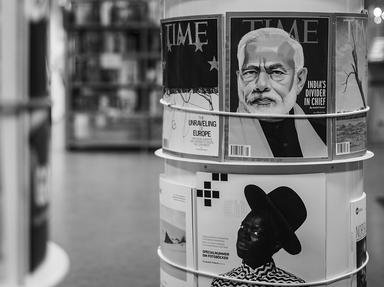Quiz Answer Key and Fun Facts
1. 1963: He took over from an assassinated President with the difficult task of healing the nation's wounds and moving on the issues of the day. Who was the 36th President of the United States?
2. 1965: America has always had an affinity for war leaders. "Time" selected a military man for this year. As the communist-backed conflict slowly drew the United States into the Vietnam era from 'advisers' to armed conflict, who was the man who led the initial organization?
3. 1966, 1968, 1969, 1975: Again, "Time" departed from naming an individual but honored a series of groups. Which of these groups did "Time" not name?
4. 1970: "Time" went back to Europe for its 1970 selection. Who was the leader of West Germany who the magazine felt that there was an ally in stemming communist expansion?
5. 1971, 1972: A President and a Secretary of State were honored in these years. It was for their skills in foreign relations. Who were they?
6. 1973: As Nixon stumbled into dishonor, the nation was in chaos. Would justice be served? Would Watergate forever cloud the American political arena? Much of the news centered on this man. Who was this man upon whose lap fell the legal responsibility?
7. 1974: As the US tried to lick its wounds from the Watergate scandal, the "Organization of Petroleum Exporting Countries" (OPEC) began to exert pressures on the economy of nations around the world. Who was the Arab leader who held so much power?
8. 1976: The interim presidency of Gerald Ford has passed, and a new President of the United States was elected. Who was this atomic scientist, peanut farmer, and former governor?
9. 1977: What was the name of the Egyptian leader who made overtures for peace with Israel?
10. 1978: As the world teetered on the brink of the Cold War, an unexpected hand came from Communist China. Who was this Chinese leader?
Source: Author
Rehaberpro
This quiz was reviewed by FunTrivia editor
Snowman before going online.
Any errors found in FunTrivia content are routinely corrected through our feedback system.

